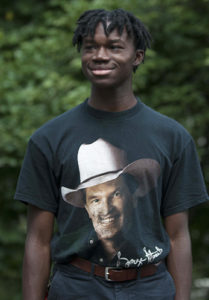
David Owolabi
I’ve spent my time at Lehigh learning who I am and who I’m not.
I’m not the only one. There are about 6,849 other people on this campus doing just about the same thing.
The more I consider who I am, the more I’m faced with the reality that I don’t fully know.
I think most young people have trouble defining themselves.
We’re all walking around, doing our best to make sense of college, and everything seems normal. This false normalcy would be shattered if you stop and ask students to define themselves.
It’d be like pulling teeth.
That conversation might go something like, “How would you define yourself?” to which I would expect the response to be, “Uh… um… uh… I think I’m an extrovert.”
The funniest thing is that we seem to have no trouble defining other people, and for some reason, we think we’re good at it.
We spend endless hours looking inward, yet we’re not really sure what’s going on.
On the flip side, we spend only a small fraction of our time trying to understand other people, and we live with the underlying belief that our assumptions about others are unquestionably correct.
I catch myself doing it all the time. I’ll see a kid around campus, maybe I’ll have a quick conversation with them and think to myself, “Alright cool. I think I know what this kid’s deal is.”
Day to day, we are walking around with at best a vague understanding about the people we spend our time with.
For friends and family, it’s got to be different, right?
I don’t think it is.
I am blessed to have a great support system. I know that if I’m ever in crisis, there are people who love me and are here to help.
Every once in a while though, people who love me dearly, will say things that beg the question: How well do these people actually understand me?
I think in some ways the desire to be completely understood is a privilege. It says something about my life that one of my greatest concerns is feeling acutely misunderstood, but in more serious cases, the feeling of being misunderstood can slip into loneliness.
I’m a senior, and, like many, I’ve found myself asking, “What am I going to do with myself after graduation?” In short, I have no idea.
I’m OK with that.
My friends and family, however, have a different idea. I’m not home much, but when I am, my friends and family love telling me what I should be doing.
“Oh, have you heard of (insert company)? I think you’d love it there.” I smile and nod but never in the history of my existence have I ever agreed with where someone told me I should work.
During the few times I’m back home, much of my time with friends and family is dedicated to me explaining who I am and why I don’t usually want the same thing that others want for me.
It’s exhausting in those times when I feel like the people closest to me don’t get me, and I’ve got a hunch that I’m not the only person who’s ever felt that way.
It hurts when we’re not understood. It’s not a unique feeling. We’ve all been there, and I’d argue that we’re all probably misunderstood more than we’re understood.
If I’m being honest, I do the same thing. I formulate opinions and act on assumptions about other people every day.
It’s simpler for us to look at others one-dimensionally. It saves time.
We put others in boxes so we have more time to deal with our own problems. I catch myself doing this. I put even my best friends into boxes at times.
But then, here I am whining when I feel like other people do the same.
To be brutally honest, I don’t think it’s anyone’s job to understand me. We have our own problems and questions to answer within ourselves.
I don’t blame anyone for not fully understanding me. Because I don’t fully understand anyone else.
What an interesting problem we’re all facing. We probably don’t understand ourselves, and we don’t understand our friends and family. When we push back on our assumptions, we find that we don’t really understand much.
Let’s embrace it. At least we’re figuring it out together.





Comment policy
Comments posted to The Brown and White website are reviewed by a moderator before being approved. Incendiary speech or harassing language, including comments targeted at individuals, may be deemed unacceptable and not published. Spam and other soliciting will also be declined.
The Brown and White also reserves the right to not publish entirely anonymous comments.
1 Comment
Watch a 4 year old watching a 2 year old and you will see the 4 year old accurately note what the 2 year old does wrong; keep watching and over time the four year old will perform the same actions as the 2 year old, not worrying about the wrongness by rationalizing. It starts early and continues as we ignore the details about who we are and what we do.
It takes much effort to realistically assess our behavior. Outsiders without an agenda are often excellent critics who should be listened to. Our brains seem to be hardwired to do what we think is best for us not what actually is best. A quick decision or habit saves energy so they are the first choices. The right decision usually takes more time, thought and energy.
Good luck in nine months when the real world calls.